Cristina Pop
FedWOA: A Federated Learning Model that uses the Whale Optimization Algorithm for Renewable Energy Prediction
Sep 19, 2023



Abstract:Privacy is important when dealing with sensitive personal information in machine learning models, which require large data sets for training. In the energy field, access to household prosumer energy data is crucial for energy predictions to support energy grid management and large-scale adoption of renewables however citizens are often hesitant to grant access to cloud-based machine learning models. Federated learning has been proposed as a solution to privacy challenges however report issues in generating the global prediction model due to data heterogeneity, variations in generation patterns, and the high number of parameters leading to even lower prediction accuracy. This paper addresses these challenges by introducing FedWOA a novel federated learning model that employs the Whale Optimization Algorithm to aggregate global prediction models from the weights of local LTSM neural network models trained on prosumer energy data. The proposed solution identifies the optimal vector of weights in the search spaces of the local models to construct the global shared model and then is subsequently transmitted to the local nodes to improve the prediction quality at the prosumer site while for handling non-IID data K-Means was used for clustering prosumers with similar scale of energy data. The evaluation results on prosumers energy data have shown that FedWOA can effectively enhance the accuracy of energy prediction models accuracy by 25% for MSE and 16% for MAE compared to FedAVG while demonstrating good convergence and reduced loss.
Social Factors in P2P Energy Trading Using Hedonic Games
Sep 04, 2023



Abstract:Lately, the energy communities have gained a lot of attention as they have the potential to significantly contribute to the resilience and flexibility of the energy system, facilitating widespread integration of intermittent renewable energy sources. Within these communities the prosumers can engage in peer-to-peer trading, fostering local collaborations and increasing awareness about energy usage and flexible consumption. However, even under these favorable conditions, prosumer engagement levels remain low, requiring trading mechanisms that are aligned with their social values and expectations. In this paper, we introduce an innovative hedonic game coordination and cooperation model for P2P energy trading among prosumers which considers the social relationships within an energy community to create energy coalitions and facilitate energy transactions among them. We defined a heuristic that optimizes the prosumers coalitions, considering their social and energy price preferences and balancing the energy demand and supply within the community. We integrated the proposed hedonic game model into a state-of-the-art blockchain-based P2P energy flexibility market and evaluated its performance within an energy community of prosumers. The evaluation results on a blockchain-based P2P energy flexibility market show the effectiveness in considering social factors when creating coalitions, increasing the total amount of energy transacted in a market session by 5% compared with other game theory-based solutions. Finally, it shows the importance of the social dimensions of P2P energy transactions, the positive social dynamics in the energy community increasing the amount of energy transacted by more than 10% while contributing to a more balanced energy demand and supply within the community.
On the Factory Floor: ML Engineering for Industrial-Scale Ads Recommendation Models
Sep 12, 2022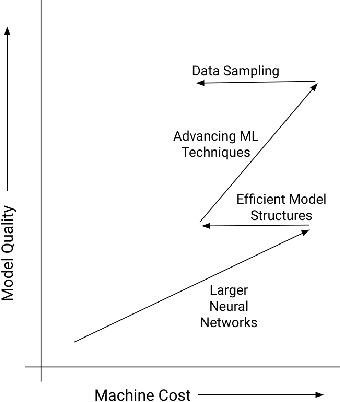
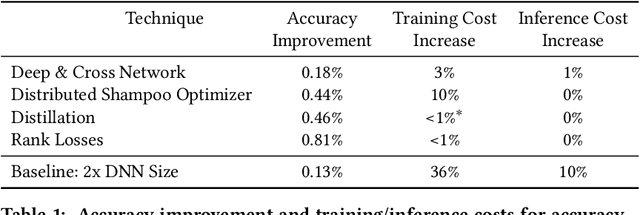
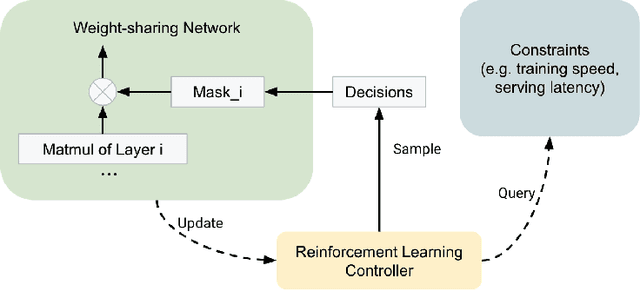
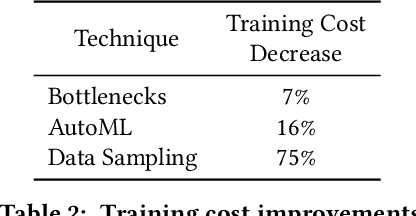
Abstract:For industrial-scale advertising systems, prediction of ad click-through rate (CTR) is a central problem. Ad clicks constitute a significant class of user engagements and are often used as the primary signal for the usefulness of ads to users. Additionally, in cost-per-click advertising systems where advertisers are charged per click, click rate expectations feed directly into value estimation. Accordingly, CTR model development is a significant investment for most Internet advertising companies. Engineering for such problems requires many machine learning (ML) techniques suited to online learning that go well beyond traditional accuracy improvements, especially concerning efficiency, reproducibility, calibration, credit attribution. We present a case study of practical techniques deployed in Google's search ads CTR model. This paper provides an industry case study highlighting important areas of current ML research and illustrating how impactful new ML methods are evaluated and made useful in a large-scale industrial setting.
Exploratory Study: Children's with Autism Awareness of being Imitated by Nao Robot
Mar 07, 2020
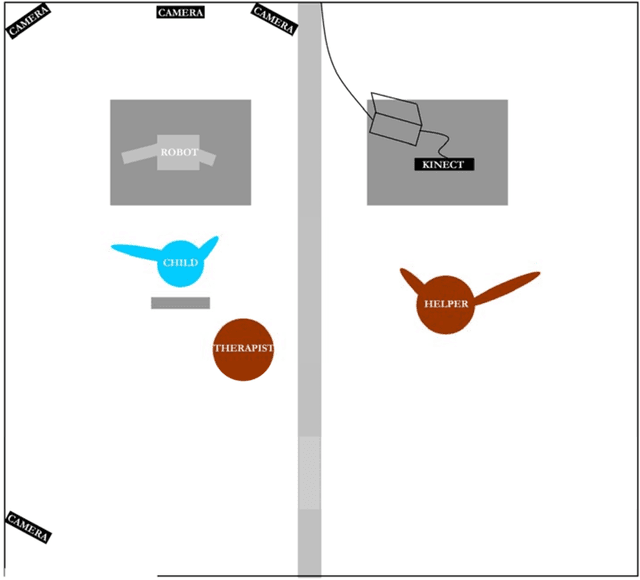
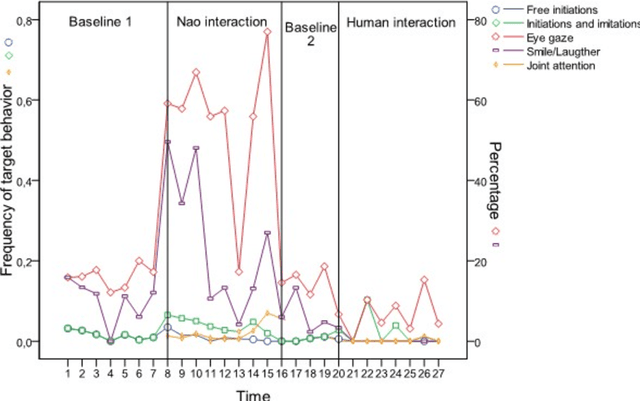
Abstract:This paper presents an exploratory study designed for children with Autism Spectrum Disorders (ASD) that investigates children's awareness of being imitated by a robot in a play/game scenario. The Nao robot imitates all the arm movement behaviors of the child in real-time in dyadic and triadic interactions. Different behavioral criteria (i.e., eye gaze, gaze shifting, initiation and imitation of arm movements, smile/laughter) were analyzed based on the video data of the interaction. The results confirm only parts of the research hypothesis. However, these results are promising for the future directions of this work.
Social Engagement of Children with Autism during Interaction with a Robot
Feb 27, 2020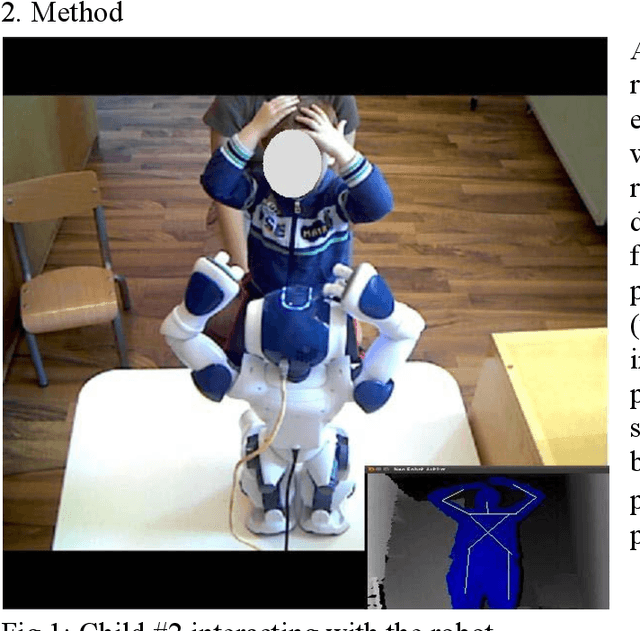
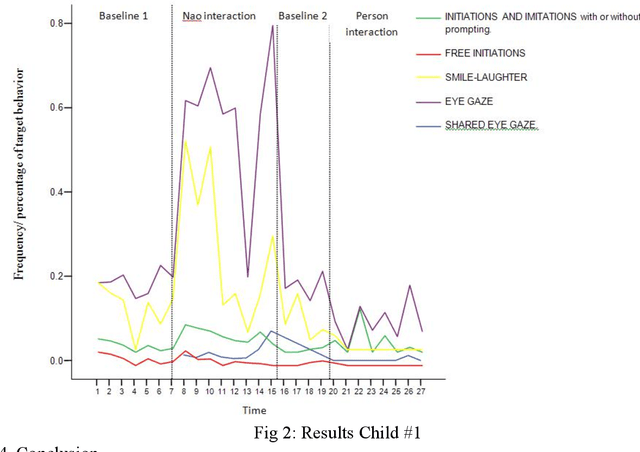
Abstract:Imitation plays an important role in development, being one of the precursors of social cognition. Even though some children with autism imitate spontaneously and other children with autism can learn to imitate, the dynamics of imitation is affected in the large majority of cases. Existing studies from the literature suggest that robots can be used to teach children with autism basic interaction skills like imitation. Based on these findings, in this study, we investigate if children with autism show more social engagement when interacting with an imitative robot (Fig 1) compared to a human partner in a motor imitation task.
 Add to Chrome
Add to Chrome Add to Firefox
Add to Firefox Add to Edge
Add to Edge